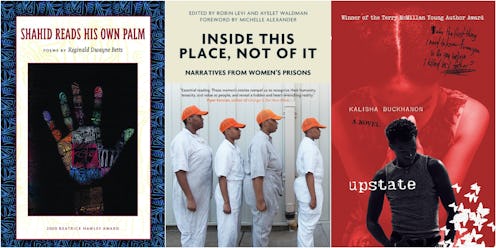
On any given day in the United States in 2018, nearly 2.3 million people are incarcerated. Our country is the largest jailer in the world. On September 27, the National Book Foundation announced the establishment of its new Literature for Justice program (LFJ), which will highlight 15 contemporary books that contextualize the mass incarceration crisis over the next three years. This year's five titles are listed below.
Since 1978, the United States' prison population has risen over 400 percent, according to the ACLU. While mass incarceration is a reality that many know to be true, it's a topic rarely covered at length in schools or even in every day conversation. We know people go to prison, but we don't always understand why. Or how many, really, are behind bars.
“Many of us will never know firsthand the realities of incarceration, but it’s our responsibility as citizens in the world to actively pursue an understanding of those experiences,” said Lisa Lucas, Executive Director of the National Book Foundation, in a press release. “Comprising multiple genres and myriad perspectives, these works of literature are able to shed light on the lives of others, enriching our understanding of very personal histories and the ways in which mass incarceration impacts them.”
The books, chosen by a five-person committee (Lost Empress author Sergio de la Pava, Locking Up Our Own author James Forman Jr., The Residue Years author Mitchell S. Jackson, The Mars Room author Rachel Kushner, and Blood in the Water author Dr. Heather Ann Thompson) work in tandem to not just provide facts on the prison crisis, but to contextualize it and to humanize it. This year, the committee has selected a collection of poetry, a memoir, an epistolary novel, a history outline, and an essay collection.
The LFJ program is part of a three-year campaign intended to build a library of diverse literature around the topic of mass incarceration. Each year, a new five-person committee will select and publicize a five-book capsule collection. Check out 2018's list below.
'A Place to Stand' by Jimmy Santiago Baca
A memoir of life before, during, and immediately after a stint in a maximum security prison, A Place to Stand chronicles Jimmy Santiago Baca's entrance into prison as an illiterate 21-year-old, and an exit, after a significant amount of time spent in solitary confinement, as a fierce poet.
'Shahid Reads His Own Palm' by Reginald Dwayne Betts
Reginald Dwayne Betts' debut poetry collection charts prison life, in all its pain and injustice. Illustrated, too, is the paradox that often tortures inmates: the fury of being behind bars, and the fear of the freedom that comes once a sentence is up.
'Upstate: A Novel' by Kalisha Buckhanon
From its searing first line — "Baby, the first thing I need to know from you is do you believe I killed my father?" — Kalisha Buckhanon's coming-of-age novel, set in 1990s New York over the course of a decade, paints a picture of young love, of fear, of bravery, and of innocence, lost. Told through letters between 16-year-old Natasha and her 17-year-old boyfriend Antonio, Upstate charts Antonio's journey through the prison system after he's accused of a horrific crime.
'Understanding Mass Incarceration: A People's Guide to the Key Civil Rights Struggle of Our Time' by James Kilgore
A straightforward journey through the United States' carceral history, James Kilgore's Understanding Mass Incarceration offers a comprehensive outline of the structure, goals, and impact of the American criminal justice system which is, currently, the largest jailer in the world.
'Inside This Place, Not of It: Narratives From Women's Prisons' edited by Ayelet Waldman and Robin Levi
A collection of 13 first-person accounts of life as a woman inside a correctional facility, Inside This Place, Not Of It details the crushing human rights violations happening behind bars, from an inmate incorrectly diagnosed with HIV (and kept on an aggressive and unnecessary drug regimen for years) to a woman punished for her cellmate's suicide. Co-edited by Ayelet Waldman, a best-selling author, and Robin Levi, staff attorney at the Women’s Rights Division of Human Rights Watch, with a forward by Michelle Alexander, a lawyer and writer of The New Jim Crow: Mass Incarceration in the Age of Colorblindness, this collection is also a monument to perseverance in the face of trauma.